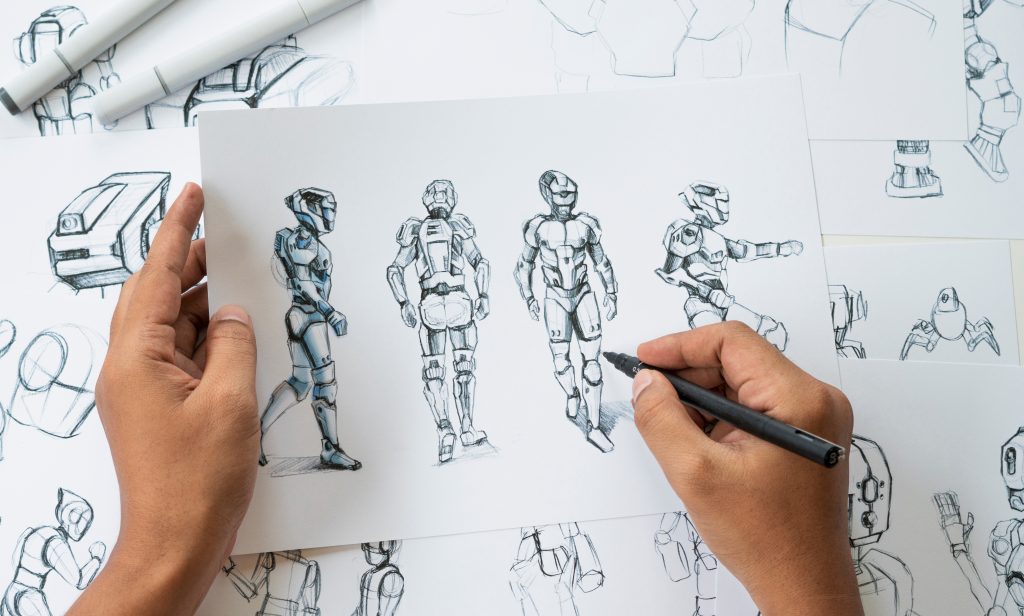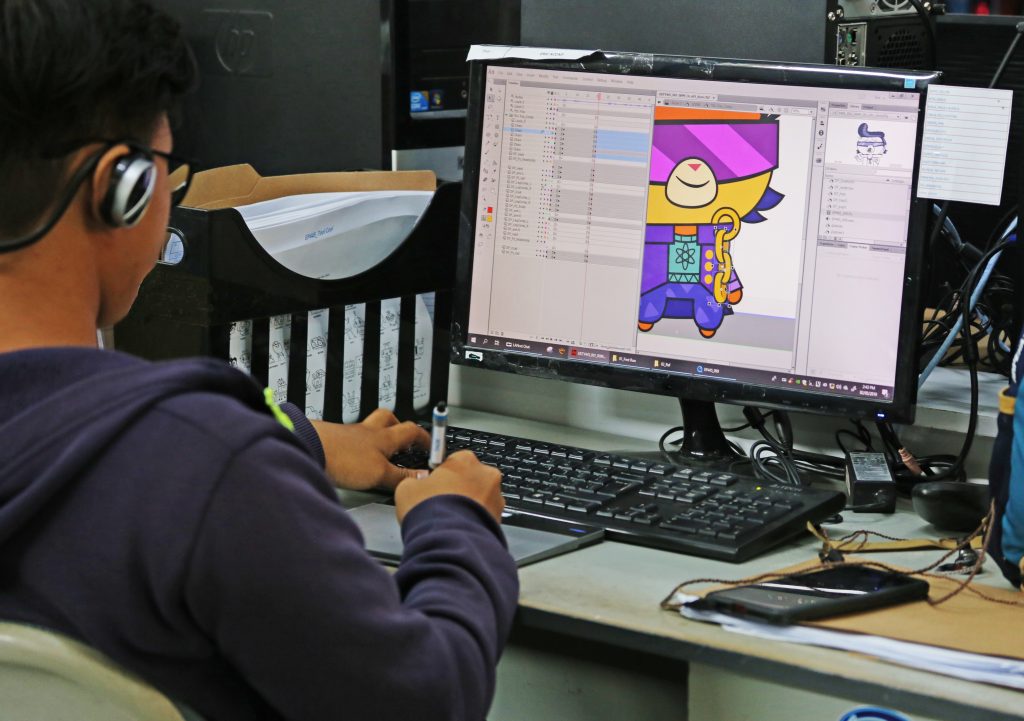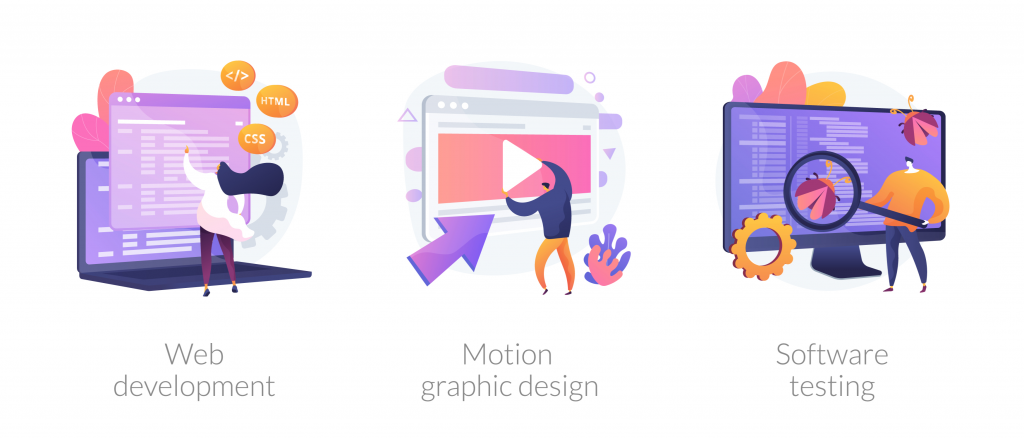How to Become an Animator Education and Career Roadmap
Students eager to break into professional animation will want to explore what type of education is necessary to become an animator. In this article, we'll talk about everything you need to know about studying to become an animator, as well as the steps you should take if you're serious about going to school for a degree in animation.

What Do Animators Do?
Animators bring drawings, whether hand-drawn or digitally created, to life for film, television, and video game productions. It is a competitive field, so the right degree from a good program can be instrumental in helping students land a job after graduation.
What Degree Do You Need To Be an Animator?
While you may be a natural when it comes to cartooning and doodling, it takes more than artistic talent to become a professional animator. Many students ask, "what education is needed to become an animator?" The answer lies in asking yourself another question: "how far do you want to go in the animation industry?"
Modern animation is complex and involves computer programming, graphics, and design skills. Although these are topics you can probably learn on your own, animation can get pretty involved. A bachelor's degree program can take you from just dreaming about a job in animation to actively working in the field.
Related: What is Animation?
What Are the Educational Requirements for Animators?
Animators are certainly not required to have a college degree, but it is strongly advised if you want a good-paying job in the field. This is because most employers want to work with candidates who have some formal education in the industry. That doesn't necessarily equate to an animation degree. Sometimes interactive media, game design, or another technology-based degree is ok as well.
Students who want to land roles with more responsibility and higher pay may even want to consider getting a master's degree in animation.
Animator Education Coursework
All schools offering degrees in animation will have art courses in many different areas such as sculpture, drawing, or painting. You may also take classes in photography, film, or design. To satisfy the animation degree requirements, many programs will also encompass various technology-based courses like:
● digital animation
● 3D and 2D programming
● story structure
● computer graphics
● sound and video editing
● Digital drawing
● kinematics
● Modeling
● gaming design
● Scripting
● sequential art
Self-Study Courses for Animation
You can learn plenty of skills in animation through local workshops, adult education programs, books, and videos on the subject. But in recent years, more and more classes have cropped up online for those who want to study independently. There are dozens of paid and free online courses to choose from on platforms like Coursera, Udemy, and Skillshare. A few examples include:
Introduction to Programming and Animation with Alice via Duke University
Interactive Computer Graphics via the University of Tokyo
Learn to Animate: Animation Principles via Udemy and Siobhan Twomey
Learn 3D Animation – The Ultimate Blender Guide via Udemy and Alex Cordebard
Intro to Motion Graphics: Animating Illustration in After Effects via Hongshu Guo
Kinetic Typography Animation in After Effects via Klarens Malluta
These courses can serve as a stepping stone into animator education and give you a better idea of what you want to study at college. They can also help you fill in any gaps in your skillset by building upon what you already know.
Internships for Animation Students
Internships are an excellent way to gain experience first-hand. They can help you build your portfolio and open up new career opportunities as well. To find internships in animation, check out websites like Internships.com or GameDesigning.org.

How Long Does a Bachelor's Degree in Animation Take?
A bachelor's in animation or similar multimedia program will take the standard four years and at least 120 credits in most cases. Like most bachelor's programs, students can often finish up sooner by taking additional sessions or increasing their course loads. Some schools offer accelerated programs that let students expedite their degree.
Can I Get My Bachelor's Degree in Animation Online?
Yes. It is not necessary to attend in-person classes to complete your animation degree online. Enrolling in an online animation program can save you time and money if you are not interested in the full campus experience. You will take the same courses as you would for an in-person program, such as 3D modeling, web design, graphic imaging, art, and more. You may even choose different concentrations to focus on.
What Is the Job Outlook for Animators?
According to the U.S. Bureau of Labor Statistics, the employment outlook for special effects artists and animators is promising. The field is expected to grow four percent through 2029, primarily due to an increased demand for visual effects and realistic animation in movies, video games, computer graphics, and mobile platforms. The average annual earnings for animators is $77,700.
What Is the Work Environment Like for Those With an Animator Degree?
Around half of the animators in the workforce are freelance contractors who work from home. Others work in offices like software firms, ad agencies, and publishers. Due to the COVID-19 pandemic, many animators now work remotely for agencies rather than being expected to show up in a traditional workplace setting.
Depending on the position, working as an animator can be busy, especially when there are deadlines to meet. Many employees in this role are expected to work late hours, holidays, or weekends. If you want to become an animator, you should expect a demanding schedule.
Education Needed To Be an Animator
We've touched upon a few animation degree requirements, but there are also some considerations when it comes to the programs available. Not all schools offer computer animator degrees. Some offer a broader area of study. Next, we'll look at a few options available for students who want to pursue a career in animation.
Animation
Some schools offer programs specifically in animation. This is the degree aspiring animators usually choose to earn because it is specific to their profession. These degrees can be offered from traditional universities or vocational art schools that offer specific programs in animation. Both types have advantages, such as vocational schools giving a comprehensive, specific education on one topic and traditional programs providing general education courses and a little more variety.
Animation degrees often have courses in film, which other options might not have but are essential for students studying animation. Students will need to evaluate each program carefully and decide on one that meets their needs, finances, and preferences best.
Multimedia Studies
This degree is also helpful for student animators who want to do animation work in different mediums—from digital effects to web animation to traditional hand-drawn animation. Multimedia art degree programs often allow students to specialize in a specific kind of art, including animation, making this a solid option for a degree needed to become an animator.
Computer science courses are often taught in these programs in addition to art skills due to digital art's reliance on technology. Students who aren't quite sure what type of art they want to specialize in might decide to pursue a degree in multimedia art to get a fee for the industry as a whole. This degree is a good option for animators who want to work on video games in particular, since concept art, models, and final animations are used heavily in the gaming industry.
General Art
A general art degree is also a strong possibility for aspiring animators. This degree is a good option for students who want to pursue a more general degree in the arts that provides them greater career flexibility down the road. Students may decide they no longer wish to be an animator or cannot enter the field to their satisfaction.
Having a general art degree gives a student more options in the future while still providing them with a solid educational foundation for being an animator. The Bureau of Labor Statistics reports that many animators enter their field with an art degree.

What Are Some of the Concentrations Offered When Pursuing a Bachelors in Animation?
Depending on the school, there may be multiple concentrations to select from, including:
Typography
Typography students learn to manipulate digital and print lettering, alphabets, and fonts. Typically, these skills are applied to market and advertising to promote brands and products. A specialization in typography can also help students who want to break into publishing or graphic design.
Character Animation
Students in a character animation concentration learn to create character performances through storytelling, life drawing, and advanced visual design. They may also learn how to incorporate audio like sound effects, dialog, and music into their work. Character animation prepares students for careers in video game development, web design, integrated cartooning, and media.
Game Design
Game design is one of the most popular concentrations in animation. Students who study game design learn the skills they need to succeed as programmers, software developers, animators, and writers. Thanks to the multi-billion dollar gaming industry, there are many jobs available for students who want to pursue an animation career in gaming design.
Advertising and Marketing
Students who want to put their animation skills to use in a marketing position may choose to concentrate their studies on advertising. This specialization teaches social media strategies, multimedia storytelling, digital branding, and design skills. Animators with a degree in marketing or advertising can apply their skills in positions with popular brands and corporate markets.
Other Qualifications
Landing a job as an animator will likely require additional qualifications in addition to a bachelor's degree. Certifications in various animation software are useful, which are usually awarded by the software manufacturers themselves. Some examples include:
PMI Project Management Professional Certification
This certification is offered through the Project Management Institute. It is designed to teach students the most in-demand project management skills needed to work effectively in teams.
AMA Professional Certified Marketer Programs
Offered by the American Marketing Association, students can acquire certification for marketing management, content marketing, and sales marketing.
Adobe Certified Associate Program
Helps students kickstart their careers with certifications in Adobe Animate, Dreamweaver, After Effects, Illustrator, and more.
IEEE Associate Software Developer Certification
The Institute of Electrical and Electronics Engineers has three certification levels in software development. For new animators, the associate program teaches skills like construction, testing, and design.
Start Building a Portfolio
Aspiring animators are also advised to begin creating a portfolio of their work while still in school. This provides employers a strong idea of an animator's style and ability. It is usually necessary to have one to land a job, whether full-time or a contract position in the creative industries.

Career Paths for Students With an Animation Degree
Often, students start out with a specific idea in mind when pursuing the education needed to become an animator. However, many find they are exposed to coursework that leads them in another direction. Here are some related career paths and their average annual salaries:
Multimedia Arts or Computer Animation
Animation and multimedia arts is the top career path for those with a computer animator degree. These professionals create two and three-dimensional models, computerized effects, and illustrations. They may take part in each component of a project from conception to production and may work in many fields, including television, video games, film, and websites.
Average Annual Salary: $77,700
Web Developer
A web developer creates, designs, and maintains websites. They usually work as freelancers but may also be hired as part of a team. Developers know all about user experience and the technical aspects of websites and can understand complex designs and ideas. Typically, they have several technical certifications in addition to a degree.
Average Annual Salary: $70,530
Art Director
An art director is an artistic leader who oversees a team to create television shows, commercials, computer games, films, and other media. An art director helps turn a story into an idea and may need to be a jack-of-all-trades at other tasks like stage design and lighting. They also may manage marketing, editing, and other tasks.
Average Annual Salary: $97,270
Graphic Designer
Graphic designers are artists who work with print and digital mediums to create ads, websites, packaging, promotional materials, labels, and other projects. They have a strong feel for design and layout and enjoy working with Photoshop, Adobe Illustrator, and other digital tools.
Average Annual Salary: $53,380
Computer Programmer
Sometimes, aspiring animators discover they have a talent for other tech-related careers such as computer programming. This role involves using various programming languages to write code which becomes part of the functioning of a software program. Programmers may also be called coders.
Average Annual Salary: $89,190
Related Resource: 15 Best Affordable Animation Degree Programs
Closing Thoughts on Animation Degree Requirements
Working in animation is a rewarding career that is ideal for those who lean toward creative and artistic pursuits. If you know that animation is something you want to pursue for a living, you can begin researching college programs that offer degrees in animation and related fields. An animation or multimedia arts degree can help you get your foot in the door as a professional animator. If you choose to hone your skills even further, it's worth looking into additional certifications or even a master's degree in animation.
Other Rankings of Interest:
5 Characteristics of a Filmmaker
How to Become an Animator Education and Career Roadmap
Source: https://affordableschools.net/faq/what-degree-is-needed-to-become-an-animator/
0 Response to "How to Become an Animator Education and Career Roadmap"
Post a Comment